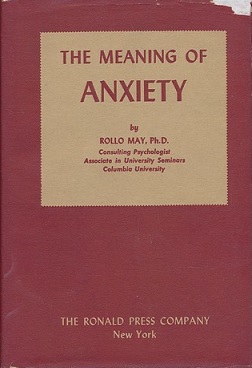The Meaning of Anxiety
The Meaning of Anxiety
The Meaning of Anxiety is a seminal work by the American existential psychologist Rollo May. First published in 1950, the book explores the concept of anxiety from an existential perspective, delving into its causes, manifestations, and implications for human existence.
Overview[edit | edit source]
In The Meaning of Anxiety, Rollo May argues that anxiety is an inherent part of the human condition. Unlike Sigmund Freud, who viewed anxiety primarily as a symptom of repressed desires, May posits that anxiety arises from the individual's confrontation with the "givens" of existence, such as freedom, isolation, meaninglessness, and death.
Key Concepts[edit | edit source]
Existential Anxiety[edit | edit source]
Existential anxiety is a central theme in May's work. It refers to the deep-seated fear that arises when individuals face the fundamental uncertainties of life. This type of anxiety is distinguished from neurotic anxiety, which is disproportionate to the situation and often linked to unresolved psychological conflicts.
Freedom and Responsibility[edit | edit source]
May discusses the relationship between freedom and responsibility, suggesting that the awareness of one's freedom can lead to anxiety. The realization that one is responsible for their own choices and the consequences thereof can be both liberating and terrifying.
Isolation[edit | edit source]
The concept of isolation is another critical aspect of May's analysis. He explores how the awareness of one's separateness from others can lead to feelings of loneliness and anxiety. This isolation is not just physical but also existential, as individuals grapple with their unique experiences and perspectives.
Meaninglessness[edit | edit source]
May also addresses the anxiety that stems from meaninglessness. In a world where traditional sources of meaning, such as religion and community, are often questioned, individuals may struggle to find purpose and significance in their lives.
Death[edit | edit source]
The awareness of death is a profound source of existential anxiety. May argues that the inevitability of death forces individuals to confront the transient nature of existence, prompting them to seek meaning and authenticity in their lives.
Impact and Legacy[edit | edit source]
The Meaning of Anxiety has had a significant impact on the fields of psychology, psychiatry, and philosophy. It has influenced various therapeutic approaches, including existential therapy and humanistic psychology. May's work continues to be a foundational text for those exploring the psychological and philosophical dimensions of anxiety.
See Also[edit | edit source]
- Existentialism
- Humanistic psychology
- Existential therapy
- Rollo May
- Anxiety
- Neurotic anxiety
- Freedom
- Isolation
- Meaninglessness
- Death
References[edit | edit source]
Further Reading[edit | edit source]
Search WikiMD
Ad.Tired of being Overweight? Try W8MD's NYC physician weight loss.
Semaglutide (Ozempic / Wegovy and Tirzepatide (Mounjaro / Zepbound) available. Call 718 946 5500.
Advertise on WikiMD
|
WikiMD's Wellness Encyclopedia |
| Let Food Be Thy Medicine Medicine Thy Food - Hippocrates |
Translate this page: - East Asian
中文,
日本,
한국어,
South Asian
हिन्दी,
தமிழ்,
తెలుగు,
Urdu,
ಕನ್ನಡ,
Southeast Asian
Indonesian,
Vietnamese,
Thai,
မြန်မာဘာသာ,
বাংলা
European
español,
Deutsch,
français,
Greek,
português do Brasil,
polski,
română,
русский,
Nederlands,
norsk,
svenska,
suomi,
Italian
Middle Eastern & African
عربى,
Turkish,
Persian,
Hebrew,
Afrikaans,
isiZulu,
Kiswahili,
Other
Bulgarian,
Hungarian,
Czech,
Swedish,
മലയാളം,
मराठी,
ਪੰਜਾਬੀ,
ગુજરાતી,
Portuguese,
Ukrainian
Medical Disclaimer: WikiMD is not a substitute for professional medical advice. The information on WikiMD is provided as an information resource only, may be incorrect, outdated or misleading, and is not to be used or relied on for any diagnostic or treatment purposes. Please consult your health care provider before making any healthcare decisions or for guidance about a specific medical condition. WikiMD expressly disclaims responsibility, and shall have no liability, for any damages, loss, injury, or liability whatsoever suffered as a result of your reliance on the information contained in this site. By visiting this site you agree to the foregoing terms and conditions, which may from time to time be changed or supplemented by WikiMD. If you do not agree to the foregoing terms and conditions, you should not enter or use this site. See full disclaimer.
Credits:Most images are courtesy of Wikimedia commons, and templates, categories Wikipedia, licensed under CC BY SA or similar.
Contributors: Prab R. Tumpati, MD

